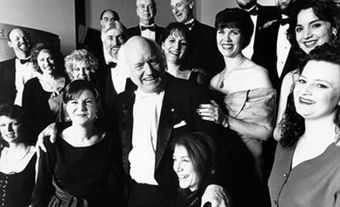National Film Board of Canada (NFB)/Office national du film du Canada (ONF). An organization created by the Canadian government following the adoption of a National Film Act in 1939. The NFB's mandate was to produce and distribute films serving the national interest and intended specifically to make Canada better known both to Canadians and to people of other countries. At the invitation of the federal government, the British documentary maker John Grierson came to Canada in 1938 to study the situation of the government's film production, at that time the responsibility of the Canadian Government Motion Picture Bureau. It was his report that prompted the National Film Act, the effect of which, in the context of the times, was to make the NFB during its first years a wartime propaganda office. In 1942, however, a production and animation department was created around the exceptional skills of Norman McLaren, who perfected a technique of composing music directly onto film. A revision of the Act in 1950 removed all possibility of direct governmental intervention in the administration of the organization. In 1956 the production centre of the NFB moved its technical installations to Montreal, but the head office remained in Ottawa. After this, production was divided between two autonomous sectors, French and English, and yielded full-length films and short features, documentaries, fiction films, informational films, animated films, etc. The board has continued to report to Parliament through the Department of Communications Canada.
There have only been three official music directors at the NFB: Louis Applebaum 1942-8, Eugene Kash 1948-50, and Robert Fleming 1958-70. From the beginning the NFB included composers - notably Maurice Blackburn and Eldon Rathburn - on its permanent staff. Others were hired on contract, among them Howard Cable, Neil Chotem, Luc Cousineau, Larry Crosley, André Gagnon, Phyllis Gummer, Yvan Landry, Michel Longtin, Oskar Morawetz, Barbara Pentland, Godfrey Ridout, Tony Romandini, Morris Surdin, Vic Vogel, and John Weinzweig. The board chose music as the subject of several films, including The Singing Pipes/Le Vent qui chante (1945, devoted to Casavant Frères), Story of a Violin (1947, with the participation of George Heinl), and a film on musical notation in Braille (1950, made with Paul Doyon). In 1975 MusiCanada, a full-length film on the different facets of Canadian musical life, was produced by Malca Gilson and Tony Ianzelo to mark World Music Week. Among the best-known artists appearing in the film were Beau Dommage, Canadian Brass, Maureen Forrester, Glenn Gould, Paul Horn, the Lyric Arts Trio, the National Arts Centre Orchestra, the National Youth Orchestra of Canada, and Les Grands Ballets Canadiens.
In 1975 the NFB began producing films for the CBC and, reciprocally, handling showings of some CBC films. By 1990 more than 6500 films had been produced, including a large number presented at international festivals, and the NFB had received over 3000 awards, including nine Oscars (Hollywood), four Palmes d'Or (Cannes), and five Robert Flaherty Awards (England). Various scores by Blackburn, Gabriel Charpentier, Alain Clavier, McLaren, Pierre Mercure, Rathburn, and Gilles Tremblay were reissued in 1977 in an album of 2 LPs, Music of the NFB (NFB l and 2).
Notable NFB Films on Music
In 1982 the NFB produced the musical film Au pays de Zom, with the bass Joseph Rouleau and music by Jacques Hétu, and in the following year Singing: A Joy in Any Language, a documentary of a tour in China by Maureen Forrester, Claude Corbeil, and Claude Savard. In 1998 the NFB produced a documentary entitled McGill, Mahler and Montreal, directed by Robert Chesterman and devoted to a performance of Mahler's 5th Symphony by the McGill Symphony Orchestra. Show Girls of 1998, directed by Meilan Lam, examines Montreal's Black jazz scene between 1920 and 1960. The documentary Spirits of Havana (2001), directed by Bay Weyman and Luis Osvaldo Garcia, follows soprano saxophonist Jane Bunnett to Cuba. A 2004 documentary directed by Pierre-Henry Salfati titled The Ninth - An Exceptional Destiny explores the political uses that have been made of Beethoven's last symphony.
Other musicians, composers, performers, choirs, and orchestras also have been the subjects of films: Paul Anka, the Leslie Bell Singers, CANO, Jean Carignan, Linton Garner, Glenn Gould, Marek Jablonski, Oliver Jones, Harry Freedman, Willie Lamothe, Félix Leclerc (Les Brûlés), Alexina Louie, Don Messer, Wilfrid Pelletier, Kate and Anna McGarrigle, The Travellers, R. Murray Schafer, the TSO under Sir Ernest MacMillan, Oscar Peterson, Eldon Rathburn, Gilles Vigneault, John Weinzweig, Healey Willan, John Wyre and Maurice Zbriger.
Studios and Viewing Centres
The NFB maintains numerous production studios across Canada and offices in New York, Chicago, London, Paris, and Sydney. Some NFB films have been adapted into as many as 60 different languages and distributed for non-commercial use by more than 80 diplomatic missions and commercial agencies in Canada and abroad. Local showings have been assured by 92 viewing centres in Canada's main cities. Copies of films, and in some cases video cassettes, have been available for rental or for purchase.
See also Films; Film scores.

 Share on Facebook
Share on Facebook Share on X
Share on X Share by Email
Share by Email Share on Google Classroom
Share on Google Classroom

